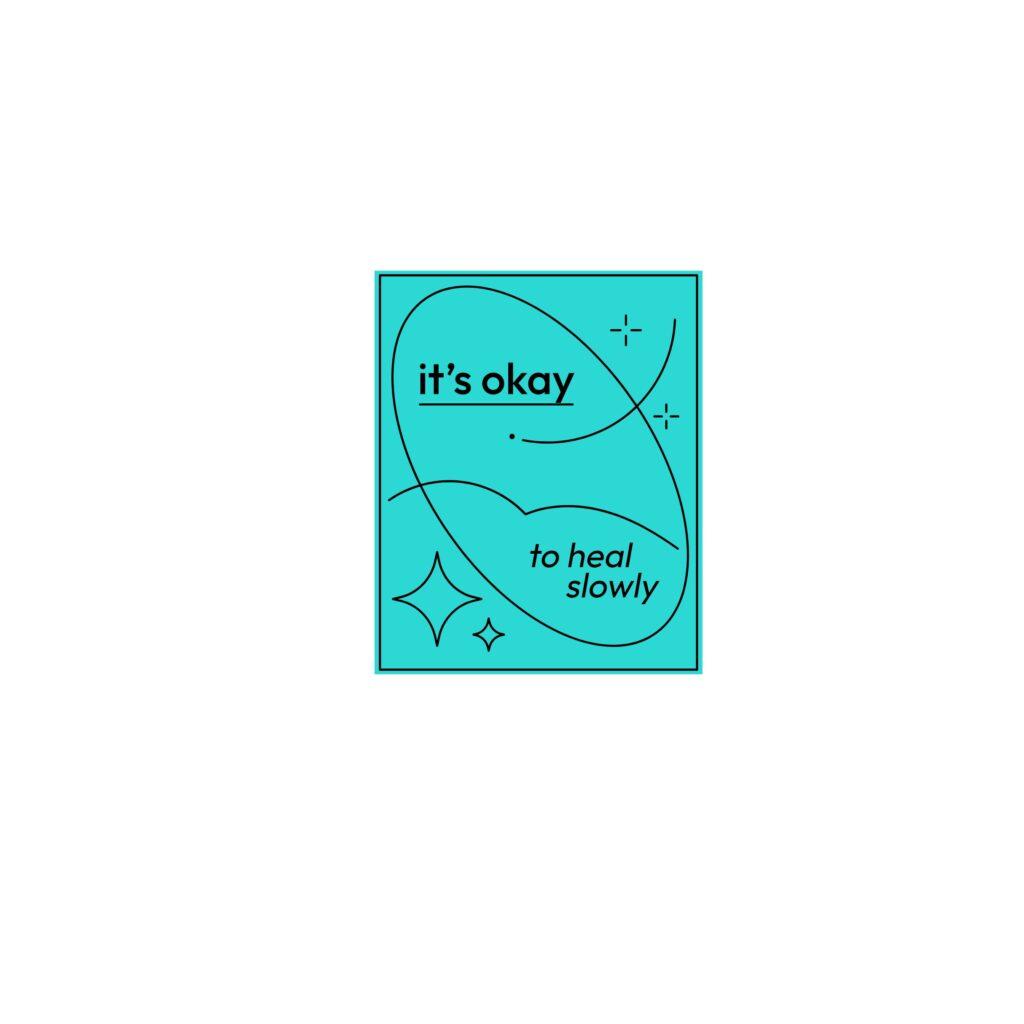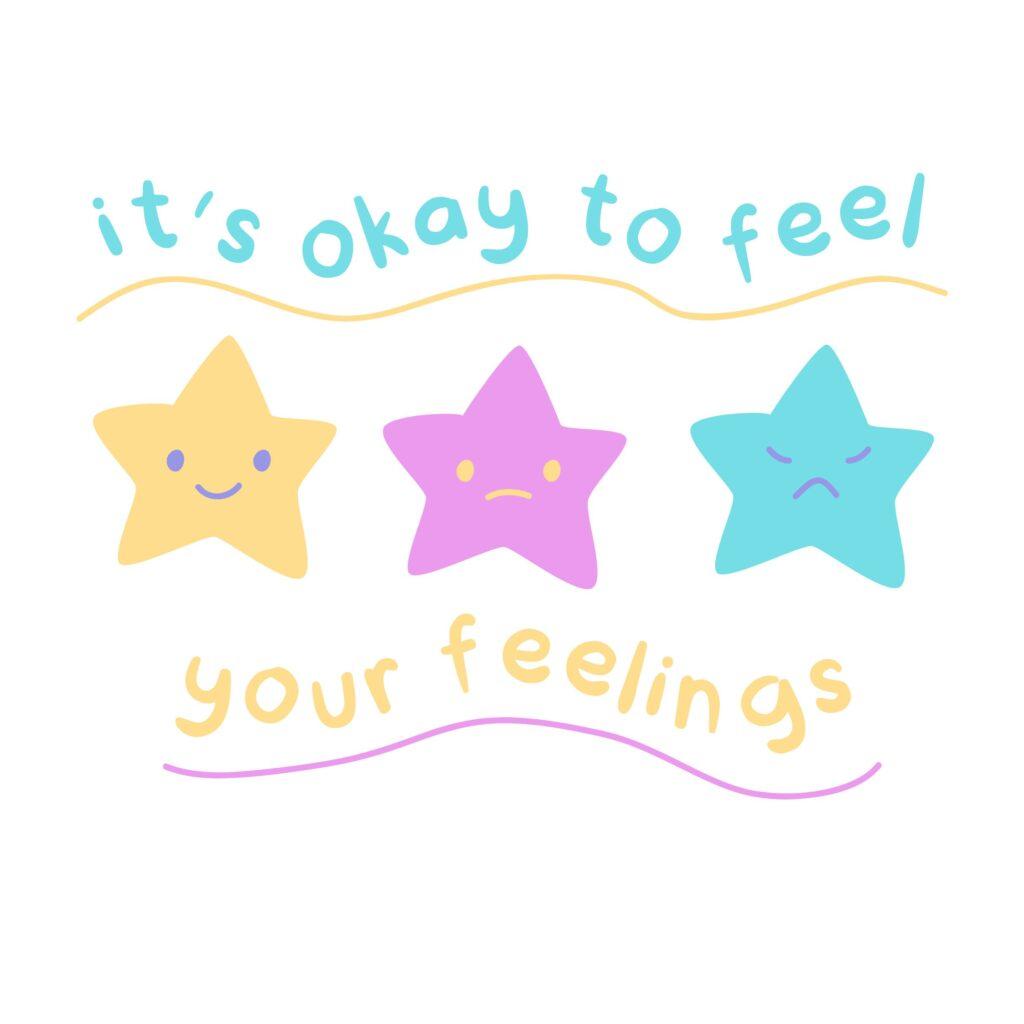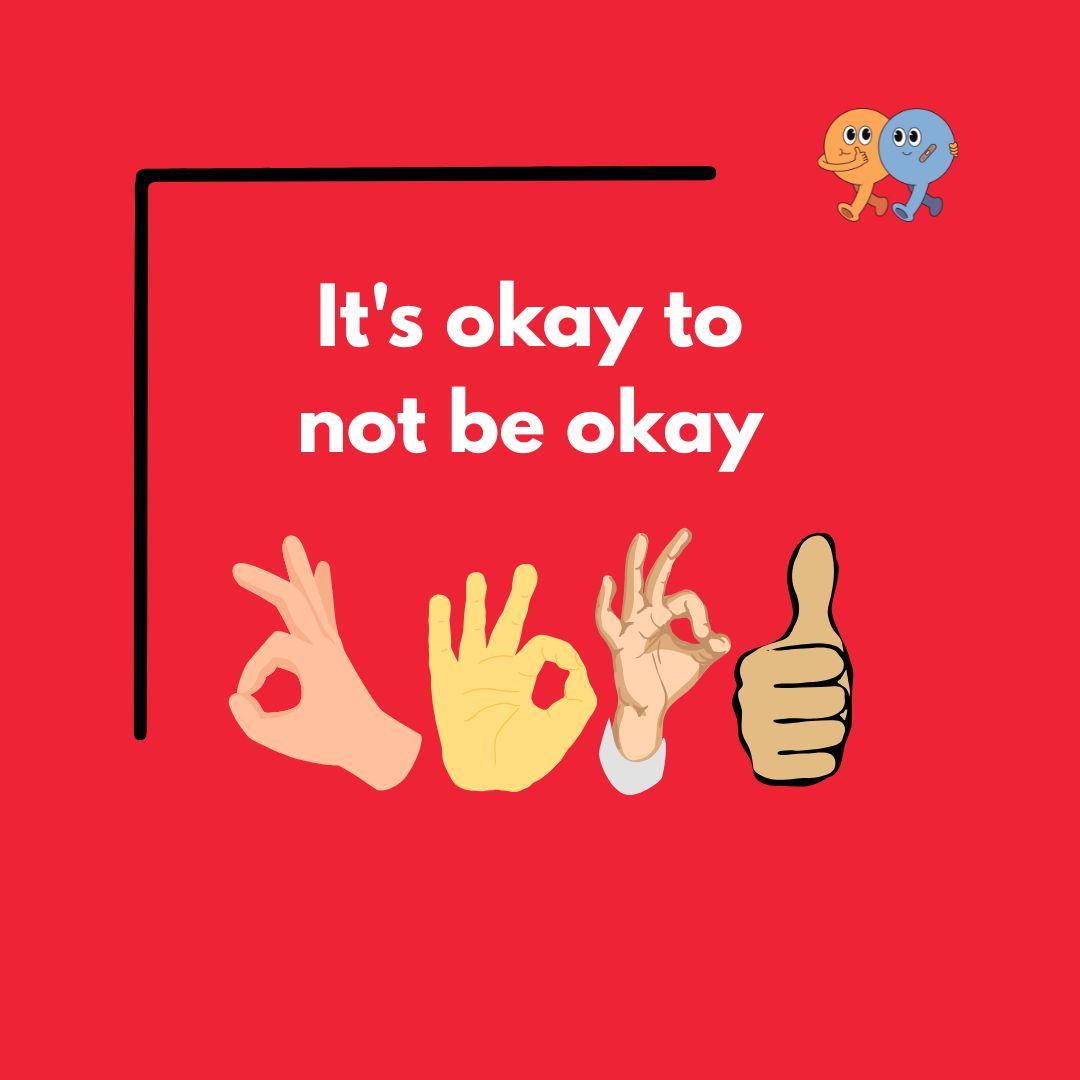
It’s Okay to Not Be Okay: Learning to Accept Yourself
- It’s Okay to Not Be Okay: Learning to Accept Yourself
- It’s okay to not be okay meaning
- Why We Struggle to Admit We’re Not Okay
- It's Your Feeling
- Playing with Emotions: Acceptance Over Control
- Priorities Over Perfection
- Why Self-Acceptance Is the Foundation of Healing
- The Importance of Being Heard
- Living Without Panic
- Choosing to Be Okay With Being Human
- Endnote
It’s okay to not be okay meaning
It’s always heard that “Be strong,” “Stay positive,” and “Keep smiling no matter what.” Scroll through social media and you’ll see endless images of happiness, success, and perfection. Yet behind the screens, many of us struggle. We wrestle with quiet sadness, silent doubts, and the overwhelming weight of expectations. And in those moments, one truth matters more than any motivational slogan: It’s okay to not be okay.
This simple sentence may feel uncomfortable at first. After all, we’ve been taught that weakness should be hidden, that negative emotions are failures, and that admitting “I’m not okay” means we’re broken. But the truth is the opposite. Saying “I’m not okay” is not giving up—it’s an act of courage. It’s choosing to play with your emotions instead of suppressing them. It’s a way of telling yourself: I am human, I am enough, and even in my lowest moments, I am still worthy of happiness.
Why We Struggle to Admit We’re Not Okay
From childhood, we are often conditioned to present a brave face. When we cry, someone tells us to stop. When we express fear, we’re told to “be strong.” Over time, we internalize the belief that sadness, anger, or anxiety are signs of weakness. This belief carries into adulthood, where we feel pressured to “have it all together”—to show success at work, stability in relationships, and constant positivity online.
But life isn’t a straight line of progress. It’s a landscape of ups and downs, joy and pain, victories and setbacks. Expecting yourself to always be okay is like expecting the weather to always be sunny—it’s unrealistic, and it robs you of the natural rhythm of life.
It’s okay; I’m struggling today. I feel like “I’m here and live.” It’s in the courage to say, “I don’t have it all together,” and in the immense relief of being met not with judgment, but with a nod of understanding that says, “Thank you for trusting me with the real you.”

It’s Your Feeling
“It’s okay to not be okay” means I will stop fighting you. I will stop wasting my energy on a civil war inside myself, trying to silence you with forced positivity or shame. I will lay down the weapons of “I should be over this by now” and “Other people have it worse.” I will simply let you be. I will sit with you, however uncomfortable it is.
This is not surrender; it is acceptance. It is me, finally listening. You are here for a reason. Perhaps you are grief, showing me the shape of a love I have lost. Perhaps you are anxiety, highlighting a value I care deeply about protecting. Perhaps you are burnout, forcing me to rest when I refused to listen to gentler cues.
By making space for you, I am not agreeing to let you stay forever. I am simply acknowledging your presence. I am saying, “I feel you. I hear you. You are a part of my experience right now.” And in doing that, I take away your power to control me from the shadows. When I bring you into the light of my awareness, you often become smaller, more manageable. You begin to transform.
“It’s okay” is the first step toward understanding you. It is the foundation of self-compassion. It is me treating myself with the same kindness I would offer a hurting friend. It is the beginning of healing, because I cannot heal a wound I refuse to admit exists.
So, feeling, you are allowed to be here. You are information. You are human. And by accepting you, I am not becoming weaker—I am finally becoming whole.
Playing with Emotions: Acceptance Over Control 
“It’s okay to not be okay” means acceptance, not control. Life isn’t perfect, and neither are we. Some days are messy. Some moments hurt. And that’s all right.
When we play with our emotions instead of resisting them, we learn their language. Anger may be telling us that a boundary has been crossed. Sadness may be signaling that we’ve lost something we value. Anxiety may be alerting us to a fear that needs compassion, not suppression.
Acceptance doesn’t mean wallowing—it means listening. It means saying, “I feel this right now, and that’s valid. But I also know it will not last forever.” By giving yourself space to feel, you build emotional flexibility—the ability to bend without breaking.
Priorities Over Perfection
A big reason many people feel “not okay” is the endless chase for perfection. We compare ourselves to others and measure our worth against unrealistic standards. But what if happiness isn’t about having everything but about honoring what truly matters to you?
Life is not defined by having the perfect job, body, house, or relationship. It’s about recognizing your priorities and investing your energy where it counts. Maybe your priority is family, or creative expression, or personal growth. When you focus on what matters most, you free yourself from the pressure of perfection.
What you don’t have doesn’t matter as much as what you do have. And when your actions align with your priorities, you find peace—even in imperfection.
Why Self-Acceptance Is the Foundation of Healing
Healing is rarely neat. It’s messy, nonlinear, and full of setbacks. But every step forward begins with self-acceptance. When you say, “It’s okay to not be okay,” you give yourself permission to stop fighting reality. Instead, you begin to work with it.
Self-acceptance doesn’t mean complacency—it means compassion. It means saying:
“I am human, not a machine.”
“I can feel pain and still deserve love.”
“I am enough, even when I’m struggling.”
From this foundation, real healing can begin. Because once you stop judging yourself for being imperfect, you can start making choices that nurture your well-being instead of punishing yourself for falling short.
The Importance of Being Heard
Often, when we’re not okay, we don’t need advice or solutions—we just need someone to listen. Saying, “This is how I feel right now, not how I will feel forever,” is a powerful way of giving voice to your struggles without letting them define you.
Being heard validates your experience. It tells you that your pain is real, but it doesn’t have to last forever. And sometimes, the act of sharing—whether with a trusted friend, a therapist, or even in a journal—is enough to release the weight you carry.
Living Without Panic
The fear of “not being okay” often causes more suffering than the feelings themselves. We panic, thinking sadness will last forever or that anxiety defines who we are. But emotions are temporary visitors.
When you accept them without panic, you rob them of their power. Instead of saying, “I shouldn’t feel this way,” you say, “I feel this way right now, and that’s okay.” This simple shift changes everything.
Acceptance turns fear into patience, and patience opens the door to healing.
Choosing to Be Okay With Being Human
At its core, “It’s okay to not be okay” is a reminder of our shared humanity. Every person on this planet struggles at times. Every heart has known sorrow. You are not alone in your pain, even if it feels that way.
Life is not about avoiding pain—it’s about learning to carry it with grace, to grow through it, and to remember that even in darkness, the possibility of light still exists.
When you embrace your humanity—your messy, imperfect, emotional self—you discover that happiness isn’t about constant smiles. It’s about resilience. It’s about choosing to keep moving, even when the road is steep.
Endnote
“It’s okay to not be okay. This is not the end of my story. This is a moment, and it will pass.”
You don’t need to fix everything instantly. You don’t need to always feel strong. You only need to remember that being human means being imperfect—and being imperfect is perfectly okay.
Happiness is not the absence of struggle. It is the habit of returning to yourself, again and again, with compassion. And that begins the moment you accept that not being okay is just another step on the path to healing.
[{"id":5272,"link":"https:\/\/happyconditionapply.com\/dont-postpone-happiness\/","name":"dont-postpone-happiness","thumbnail":{"url":"https:\/\/happyconditionapply.com\/wp-content\/uploads\/2026\/02\/Postpone-Happiness-scaled.jpg","alt":"Postpone Happiness"},"title":"Don't Postpone Happiness","postMeta":[],"author":{"name":"rekhamahajan031","link":"https:\/\/happyconditionapply.com\/author\/rekhamahajan031\/"},"date":"Feb 28, 2026","dateGMT":"2026-02-28 12:52:28","modifiedDate":"2026-02-28 12:52:31","modifiedDateGMT":"2026-02-28 12:52:31","commentCount":"0","commentStatus":"open","categories":{"coma":"<a href=\"https:\/\/happyconditionapply.com\/category\/uncategorized\/\" rel=\"category tag\">Blog<\/a>","space":"<a href=\"https:\/\/happyconditionapply.com\/category\/uncategorized\/\" rel=\"category tag\">Blog<\/a>"},"taxonomies":{"post_tag":""},"readTime":{"min":3,"sec":26},"status":"publish","excerpt":""},{"id":5182,"link":"https:\/\/happyconditionapply.com\/happiness-is-feeling\/","name":"happiness-is-feeling","thumbnail":{"url":"https:\/\/happyconditionapply.com\/wp-content\/uploads\/2026\/01\/happiness-is-feeling.jpg","alt":"Happiness is feeling"},"title":"Happiness is Feeling","postMeta":[],"author":{"name":"rekhamahajan031","link":"https:\/\/happyconditionapply.com\/author\/rekhamahajan031\/"},"date":"Jan 28, 2026","dateGMT":"2026-01-28 07:17:22","modifiedDate":"2026-01-28 07:17:25","modifiedDateGMT":"2026-01-28 07:17:25","commentCount":"0","commentStatus":"open","categories":{"coma":"<a href=\"https:\/\/happyconditionapply.com\/category\/uncategorized\/\" rel=\"category tag\">Blog<\/a>","space":"<a href=\"https:\/\/happyconditionapply.com\/category\/uncategorized\/\" rel=\"category tag\">Blog<\/a>"},"taxonomies":{"post_tag":""},"readTime":{"min":5,"sec":47},"status":"publish","excerpt":""},{"id":4778,"link":"https:\/\/happyconditionapply.com\/expectation-vs-reality\/","name":"expectation-vs-reality","thumbnail":{"url":"https:\/\/happyconditionapply.com\/wp-content\/uploads\/2025\/12\/Split-Screen-Comparison.jpg","alt":"\"Expectation vs Reality: The Truth Behind Our Biggest Hopes\""},"title":"Expectation vs Reality","postMeta":[],"author":{"name":"rekhamahajan031","link":"https:\/\/happyconditionapply.com\/author\/rekhamahajan031\/"},"date":"Dec 28, 2025","dateGMT":"2025-12-28 06:02:00","modifiedDate":"2025-12-28 06:02:03","modifiedDateGMT":"2025-12-28 06:02:03","commentCount":"0","commentStatus":"open","categories":{"coma":"<a href=\"https:\/\/happyconditionapply.com\/category\/uncategorized\/\" rel=\"category tag\">Blog<\/a>","space":"<a href=\"https:\/\/happyconditionapply.com\/category\/uncategorized\/\" rel=\"category tag\">Blog<\/a>"},"taxonomies":{"post_tag":""},"readTime":{"min":9,"sec":29},"status":"publish","excerpt":""},{"id":5106,"link":"https:\/\/happyconditionapply.com\/happiness-surprise\/","name":"happiness-surprise","thumbnail":{"url":"https:\/\/happyconditionapply.com\/wp-content\/uploads\/2025\/11\/30-Day-Happiness-Surprise-Challenge-scaled.jpeg","alt":"30-Day Happiness Surprise Challenge"},"title":"Happiness Surprise","postMeta":[],"author":{"name":"rekhamahajan031","link":"https:\/\/happyconditionapply.com\/author\/rekhamahajan031\/"},"date":"Nov 28, 2025","dateGMT":"2025-11-28 06:49:28","modifiedDate":"2025-11-28 06:51:28","modifiedDateGMT":"2025-11-28 06:51:28","commentCount":"0","commentStatus":"open","categories":{"coma":"<a href=\"https:\/\/happyconditionapply.com\/category\/post-changellage-series\/\" rel=\"category tag\">Post-changellage series<\/a>","space":"<a href=\"https:\/\/happyconditionapply.com\/category\/post-changellage-series\/\" rel=\"category tag\">Post-changellage series<\/a>"},"taxonomies":{"post_tag":""},"readTime":{"min":1,"sec":21},"status":"publish","excerpt":""},{"id":5056,"link":"https:\/\/happyconditionapply.com\/walking-alone\/","name":"walking-alone","thumbnail":{"url":"https:\/\/happyconditionapply.com\/wp-content\/uploads\/2025\/10\/walking-alone.png","alt":"walking alone"},"title":"Walking Alone","postMeta":[],"author":{"name":"rekhamahajan031","link":"https:\/\/happyconditionapply.com\/author\/rekhamahajan031\/"},"date":"Nov 10, 2025","dateGMT":"2025-11-10 05:32:24","modifiedDate":"2025-11-10 05:32:27","modifiedDateGMT":"2025-11-10 05:32:27","commentCount":"0","commentStatus":"open","categories":{"coma":"<a href=\"https:\/\/happyconditionapply.com\/category\/uncategorized\/\" rel=\"category tag\">Blog<\/a>","space":"<a href=\"https:\/\/happyconditionapply.com\/category\/uncategorized\/\" rel=\"category tag\">Blog<\/a>"},"taxonomies":{"post_tag":""},"readTime":{"min":9,"sec":4},"status":"publish","excerpt":"Walking alone is one of the simplest yet most powerful ways to move from being content to being happier. It\u2019s not about escaping the situation\u2014it\u2019s about reconnecting with yourself."},{"id":5047,"link":"https:\/\/happyconditionapply.com\/habit-means-action\/","name":"habit-means-action","thumbnail":{"url":"https:\/\/happyconditionapply.com\/wp-content\/uploads\/2025\/10\/five-habit-of-formation.png","alt":"Habit Meaning"},"title":"Habit Means Action","postMeta":[],"author":{"name":"rekhamahajan031","link":"https:\/\/happyconditionapply.com\/author\/rekhamahajan031\/"},"date":"Oct 16, 2025","dateGMT":"2025-10-16 07:28:10","modifiedDate":"2025-10-16 07:33:28","modifiedDateGMT":"2025-10-16 07:33:28","commentCount":"0","commentStatus":"open","categories":{"coma":"<a href=\"https:\/\/happyconditionapply.com\/category\/web-stories\/\" rel=\"category tag\">web stories<\/a>","space":"<a href=\"https:\/\/happyconditionapply.com\/category\/web-stories\/\" rel=\"category tag\">web stories<\/a>"},"taxonomies":{"post_tag":""},"readTime":{"min":0,"sec":47},"status":"publish","excerpt":""},{"id":4953,"link":"https:\/\/happyconditionapply.com\/habit-meaning\/","name":"habit-meaning","thumbnail":{"url":"https:\/\/happyconditionapply.com\/wp-content\/uploads\/2025\/10\/five-habit-of-formation.png","alt":"Habit Meaning"},"title":"Habit Meaning","postMeta":[],"author":{"name":"rekhamahajan031","link":"https:\/\/happyconditionapply.com\/author\/rekhamahajan031\/"},"date":"Oct 16, 2025","dateGMT":"2025-10-16 05:52:08","modifiedDate":"2025-10-16 07:36:09","modifiedDateGMT":"2025-10-16 07:36:09","commentCount":"0","commentStatus":"open","categories":{"coma":"<a href=\"https:\/\/happyconditionapply.com\/category\/uncategorized\/\" rel=\"category tag\">Blog<\/a>","space":"<a href=\"https:\/\/happyconditionapply.com\/category\/uncategorized\/\" rel=\"category tag\">Blog<\/a>"},"taxonomies":{"post_tag":""},"readTime":{"min":6,"sec":3},"status":"publish","excerpt":"Habit meaning is not about intensity; it\u2019s about consistency\u2014the quiet force that makes willpower almost irrelevant."},{"id":4931,"link":"https:\/\/happyconditionapply.com\/its-okay-to-not-be-okay\/","name":"its-okay-to-not-be-okay","thumbnail":{"url":"https:\/\/happyconditionapply.com\/wp-content\/uploads\/2025\/09\/cropped-Its-okay-not-to-be-okay-cover-scaled-1.jpg","alt":"It's okay, not to be okay cover"},"title":"It\u2019s okay to not be okay","postMeta":[],"author":{"name":"rekhamahajan031","link":"https:\/\/happyconditionapply.com\/author\/rekhamahajan031\/"},"date":"Sep 23, 2025","dateGMT":"2025-09-23 04:56:46","modifiedDate":"2025-09-23 04:56:50","modifiedDateGMT":"2025-09-23 04:56:50","commentCount":"0","commentStatus":"open","categories":{"coma":"<a href=\"https:\/\/happyconditionapply.com\/category\/web-stories\/\" rel=\"category tag\">web stories<\/a>","space":"<a href=\"https:\/\/happyconditionapply.com\/category\/web-stories\/\" rel=\"category tag\">web stories<\/a>"},"taxonomies":{"post_tag":""},"readTime":{"min":0,"sec":53},"status":"publish","excerpt":"\u201cIt\u2019s okay to not be okay\u201d means acceptance, not control. Life isn\u2019t perfect, and neither are we. Some days are messy. Some moments hurt. And that\u2019s all right."},{"id":4642,"link":"https:\/\/happyconditionapply.com\/its-okay-to-not-be-okay-meaning\/","name":"its-okay-to-not-be-okay-meaning","thumbnail":{"url":"https:\/\/happyconditionapply.com\/wp-content\/uploads\/2025\/08\/Its-okay-to-not-be-okay.jpg","alt":"It's okay to not be okay meaning"},"title":"It\u2019s okay to not be okay meaning","postMeta":[],"author":{"name":"rekhamahajan031","link":"https:\/\/happyconditionapply.com\/author\/rekhamahajan031\/"},"date":"Sep 23, 2025","dateGMT":"2025-09-23 04:32:41","modifiedDate":"2025-09-29 05:04:36","modifiedDateGMT":"2025-09-29 05:04:36","commentCount":"0","commentStatus":"open","categories":{"coma":"<a href=\"https:\/\/happyconditionapply.com\/category\/uncategorized\/\" rel=\"category tag\">Blog<\/a>","space":"<a href=\"https:\/\/happyconditionapply.com\/category\/uncategorized\/\" rel=\"category tag\">Blog<\/a>"},"taxonomies":{"post_tag":""},"readTime":{"min":6,"sec":37},"status":"publish","excerpt":"\u201cIt\u2019s okay to not be okay\u201d means acceptance, not control. Life isn\u2019t perfect, and neither are we. Some days are messy. Some moments hurt. And that\u2019s all right."},{"id":4788,"link":"https:\/\/happyconditionapply.com\/happiness-is-a-habit\/","name":"happiness-is-a-habit","thumbnail":{"url":"https:\/\/happyconditionapply.com\/wp-content\/uploads\/2025\/08\/happiness-is-habit2-scaled.jpg","alt":"Happiness is a habit."},"title":"Happiness is a Habit","postMeta":[],"author":{"name":"rekhamahajan031","link":"https:\/\/happyconditionapply.com\/author\/rekhamahajan031\/"},"date":"Sep 6, 2025","dateGMT":"2025-09-06 08:41:04","modifiedDate":"2025-09-06 11:24:48","modifiedDateGMT":"2025-09-06 11:24:48","commentCount":"0","commentStatus":"open","categories":{"coma":"<a href=\"https:\/\/happyconditionapply.com\/category\/uncategorized\/\" rel=\"category tag\">Blog<\/a>","space":"<a href=\"https:\/\/happyconditionapply.com\/category\/uncategorized\/\" rel=\"category tag\">Blog<\/a>"},"taxonomies":{"post_tag":""},"readTime":{"min":8,"sec":23},"status":"publish","excerpt":"\"Happiness is a habit, but it starts with\u00a0you. It requires\u00a0action\u00a0based on the\u00a0direction\u00a0you\u00a0want, practiced in the\u00a0present\u00a0moment of your\u00a0daily life.\""},{"id":4772,"link":"https:\/\/happyconditionapply.com\/happy-condition-2\/","name":"happy-condition-2","thumbnail":{"url":"https:\/\/happyconditionapply.com\/wp-content\/uploads\/2024\/02\/cropped-happiness-is-happiness.jpg","alt":"Happiness attracts happiness"},"title":"Happy condition","postMeta":[],"author":{"name":"rekhamahajan031","link":"https:\/\/happyconditionapply.com\/author\/rekhamahajan031\/"},"date":"Aug 3, 2025","dateGMT":"2025-08-03 07:21:03","modifiedDate":"2025-08-03 07:39:05","modifiedDateGMT":"2025-08-03 07:39:05","commentCount":"0","commentStatus":"open","categories":{"coma":"<a href=\"https:\/\/happyconditionapply.com\/category\/web-stories\/\" rel=\"category tag\">web stories<\/a>","space":"<a href=\"https:\/\/happyconditionapply.com\/category\/web-stories\/\" rel=\"category tag\">web stories<\/a>"},"taxonomies":{"post_tag":""},"readTime":{"min":0,"sec":42},"status":"publish","excerpt":"Happy condition quiz to create condition for yourself."},{"id":4538,"link":"https:\/\/happyconditionapply.com\/happy-condition\/","name":"happy-condition","thumbnail":{"url":"https:\/\/happyconditionapply.com\/wp-content\/uploads\/2025\/07\/happy-condition.jpg","alt":"Happy Condition"},"title":"Happy Condition","postMeta":[],"author":{"name":"rekhamahajan031","link":"https:\/\/happyconditionapply.com\/author\/rekhamahajan031\/"},"date":"Aug 3, 2025","dateGMT":"2025-08-03 06:25:12","modifiedDate":"2025-08-03 07:22:59","modifiedDateGMT":"2025-08-03 07:22:59","commentCount":"0","commentStatus":"open","categories":{"coma":"<a href=\"https:\/\/happyconditionapply.com\/category\/uncategorized\/\" rel=\"category tag\">Blog<\/a>","space":"<a href=\"https:\/\/happyconditionapply.com\/category\/uncategorized\/\" rel=\"category tag\">Blog<\/a>"},"taxonomies":{"post_tag":""},"readTime":{"min":4,"sec":41},"status":"publish","excerpt":""}]


Leave a Reply